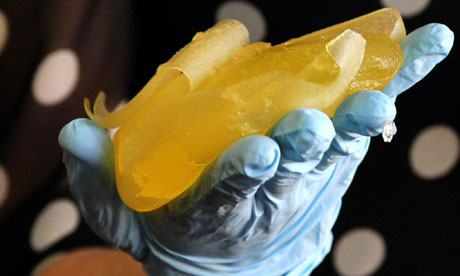
A further 7,000 women may be victims of the PIP breast implant scandal, the government has revealed, following tests that show substandard silicone was used to fill the implants for much longer than had been thought.
The health secretary, Andrew Lansley, said that women who were given implants made by the French company Poly Implant Prosthese (PIP) before 2001 may also want to see their surgeon or GP, although some of the implants will have been removed by now, given a normal lifespan of around 10 years.
"The French regulator has confirmed this week that more women may be affected by the criminal activity of the French breast implant manufacturer PIP," Lansley said in a statement.
"These women are the victims of a fraudulent company and I know this situation is causing a huge amount of anxiety.
"I want to reassure those affected by the news today that they will be provided with all the help they need from the NHS. We are still working to get private clinics to live up to their responsibilities and look after their patients. Our commitment is to ensure support for all women from the NHS if needed; we will continue to press for the same standard of care or redress from private providers."
More than 40,000 women in the UK were already thought to have had PIP implants which the manufacturer had filled with an industrial grade silicone used in mattresses. The French authorities had until now said that the use of substandard silicone began in 2001.
But in response to questions from the UK regulator, the Medicines and Healthcare products Regulatory Agency (MHRA), the French authorities have now said the use began earlier, potentially affecting 7,000 more women in Britain.
The independent expert group set up to investigate the PIP scandal, led by NHS medical director Sir Bruce Keogh, says there is not enough evidence of harm to justify routine removal, although the data kept by private cosmetic surgery clinics on the outcomes of the operations they carried out is poor. But there is no evidence that leaking industrial grade silicone is causing cancer or other serious harm as once feared.
Women who had an implant following mastectomy for breast cancer on the NHS have been offered removal and replacement on the NHS. Some private cosmetic chains, however, such as the Harley Medical Group, have refused to remove the implants free of charge.
The Department of Health says it believes these private clinics are in dereliction of their duty to their patients to provide aftercare, but where the clinic refuses to help and the implant needs to be removed, a woman will be offered surgery on the NHS.
"The expert group advises that there is no evidence to suggest that every woman with a PIP implant should have them removed. But we know this is a worrying time for them and want them to be able to see a GP or specialist to get reassurance and have them removed if necessary," said Dame Sally Davies, the chief medical officer.
"We will be placing adverts in the weekend papers again to inform all women with PIP implants about the advice from the experts and how they can get help if they are concerned. I have also written to GPs today to remind them that we want them to help women with PIP implants."
Authorities in the Netherlands also put out a warning, saying that women who had PIP implants before 2001 should consider having them removed – which is in line with its advice to women who had their implants after that date. Far smaller numbers were given PIP implants in the Netherlands than the UK – an estimated 2,700 since 2001.
Jean-Claude Mas, who owned the company, which has now been bankrupted and closed, is in prison in France awaiting trial. He began selling the implants in 1992.
• This article was amended on 19 March 2012. The original mentioned that Transform is one of the private cosmetic chains refusing to remove implants free of charge. It also suggested that the original PIP implants were sold under the name Silopren. Both points have been deleted as incorrect. We are happy to make this clear.

